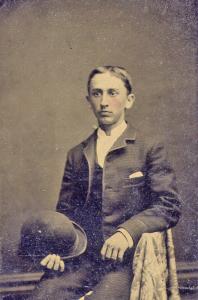Calling
"Calling" was a somewhat ritualized version of the fine old American custom of "visiting". It was not nearly so important for the gentleman as it was for the lady. It generally fell upon the middle class lady to do what had to be done to hold "Society" together. Even if the gentleman was doing the calling, it was generally the lady who was receiving callers. Ladies did not call on gentlemen except on matters of business. Gentleman called on one another with little ceremony.

"If you are thrown amongst fashionable people, you must not pay a visit to a lady before two o'clock PM, nor after four, as if you call before that time, you will interrupt those avocations which more or less occupy every lady in the early part of the day: if later than four o'clock, you will prevent her driving out"
Hints on Etiquette, 1836
"[Calls]..are those of ceremony, friendship and condolence, and occupy no small portion of time.
Such visits are necessary, in order to maintain good feelings between members of society...
...Professional men, are not however, expected to pay such visits, because their time is preoccupied; but they form almost the only exception"
Martine's Handbook, 1866
"If your friend or acquaintance is [away] from home, leave a card...the servant will answer your inquiry and receive your card; but on no account ask leave to go in and rest; neither urge your wish if you fancy the lady whom you desire to see is really at home or even if you flatter yourself that she would make an exception in your favor. Some people think that the form of words 'not at home' is readily understood to mean that the master or mistress of the house have no wish to see even his or her most intimate acquaintances."
Martine's Handbook, 1866
"A gentleman when making a formal call should retain his hat and gloves in his hands on entering the room. The hat should not be laid upon the table or stand, unless it is found necessary from some cause to set it down. In that case, place it upon the floor. An umbrella should be left in the hall. In an informal call, the hat, gloves, overcoat and cane may be left in the hall."
Our Deportment, 1881
"When one moves into a new neighborhood, it is the place of the neighbors to extend the hand of welcome to the strangers. The ladies should call on Mrs. A, the newcomer, just as soon as they think she is settled. And the gentleman should make it a point to get acquainted Mr. A, if not by a call, by speaking to him in the drug store or where ever they may meet...
Where a woman makes calls in the afternoon, it is always cheery for the hostess to offer a cup of tea with crackers or cake...It does not seem necessary to have visiting cards. In a small place everyone knows who everyone is, and while it is all right to have them, still they are oftener not used than used. The name of the caller is left by saying "Tell Mr. A that Mr. B called; nothing important".
NOTE: I included this as it is a rare glimpse (rare at least for etiquette books) at what the vast majority of Americans were doing. It was placed in the book to contrast country manners with city manners. These, of course, are country manners.
Correct Social Usage, 1903
"Besides leaving a card, leave all the small articles of value that you may find lying about in the dressing room"
The Cynic's Rules of Conduct, 1905
